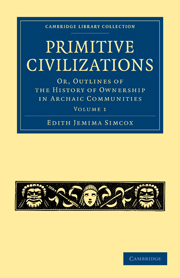Book contents
- Frontmatter
- PREFACE
- Contents
- CHAPTER 1 INTRODUCTION
- CHAPTER II PREHISTORIC PROBLEMS
- BOOK I OWNERSHIP IN EGYPT
- CHAPTER I THE MONARCHY AND THE ROYAL OFFICERS
- CHAPTER II THE ECONOMIC ORDER
- CHAPTER III COMMERCE AND INDUSTRY
- CHAPTER IV CASTE AND DESCENT
- CHAPTER V THE MILITARY CLASS
- CHAPTER VI THE NATIONAL RELIGION AND THE PRIESTHOOD
- CHAPTER VII CIVIL LAW AND CUSTOM
- CHAPTER VIII DOMESTIC RELATIONS AND FAMILY LAW
- BOOK II ANCIENT BABYLONIA
- BOOK III FROM MASSALIA TO MALABAR
CHAPTER IV - CASTE AND DESCENT
Published online by Cambridge University Press: 07 September 2011
- Frontmatter
- PREFACE
- Contents
- CHAPTER 1 INTRODUCTION
- CHAPTER II PREHISTORIC PROBLEMS
- BOOK I OWNERSHIP IN EGYPT
- CHAPTER I THE MONARCHY AND THE ROYAL OFFICERS
- CHAPTER II THE ECONOMIC ORDER
- CHAPTER III COMMERCE AND INDUSTRY
- CHAPTER IV CASTE AND DESCENT
- CHAPTER V THE MILITARY CLASS
- CHAPTER VI THE NATIONAL RELIGION AND THE PRIESTHOOD
- CHAPTER VII CIVIL LAW AND CUSTOM
- CHAPTER VIII DOMESTIC RELATIONS AND FAMILY LAW
- BOOK II ANCIENT BABYLONIA
- BOOK III FROM MASSALIA TO MALABAR
Summary
The whole fabric of Egyptian civilization and society is so uniform, so simple, and yet so massive, and, like the monuments of its art, so calmly impenetrable to decay or change, that it is particularly difficult to deal analytically with its different aspects and elements. As botanists tell us that every plant is an arrangement of more or less variously modified leaves, so, in the land of the papyrus and the lotus, every relationship seems intended to reproduce the state of friendly sociableness or affectionate utility which is the essence or condition of domestic happiness; and the information to be gathered from existing sources, respecting laws, religion, custom, and history, is so mingled together as to make it doubtful whether any one of these can be understood alone.
Questions as to the ownership of land in Egypt have been mixed up with theories as to the privileges of priests and soldiers, which form a part of the general problem as to the existence of hereditary caste; and the views taken on this point have, in their turn, an important bearing on the history and position of the monarchy. The rule governing the succession to the throne is connected both with the political and the family organization, and the provision actually made for the priesthood and the military class touches both the industrial and the administrative system; so that no arrangement of topics can altogether do away with the risk of repetitions and anticipations.
- Type
- Chapter
- Information
- Primitive CivilizationsOr, Outlines of the History of Ownership in Archaic Communities, pp. 108 - 128Publisher: Cambridge University PressPrint publication year: 2010First published in: 1894



